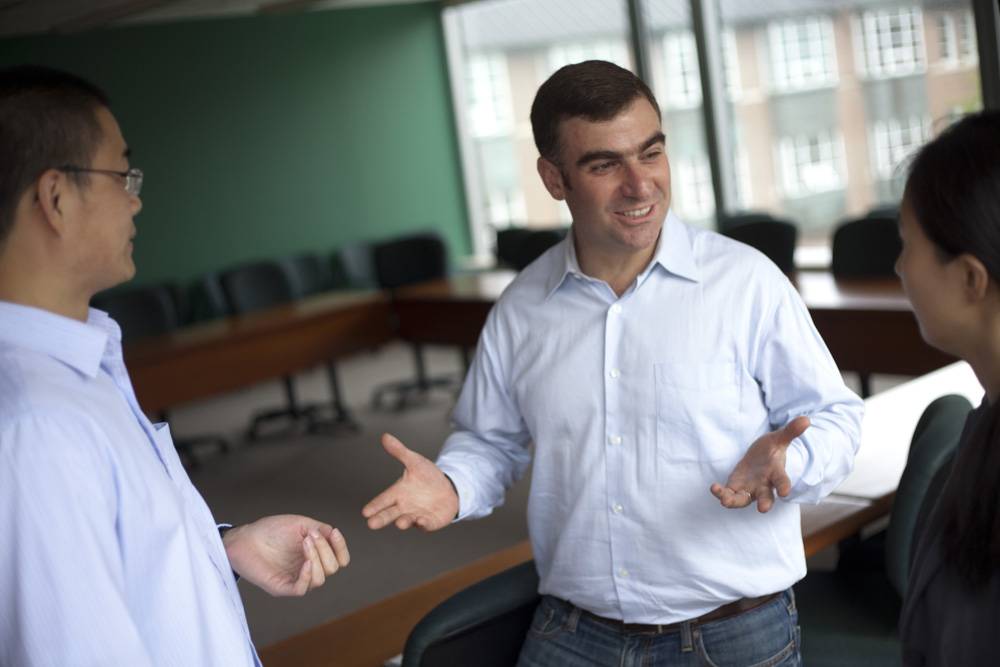In Chinese and American Companies, a Tale of Two Networks
Research project exposes students to the way faculty create new knowledge.

A research project organized by Tuck’s Center for Global Business and Government exposes students to the way faculty create new knowledge.
Take two people with similar technical skills and backgrounds. Why might one climb rapidly up the corporate ladder while her colleague’s career stagnates? One answer, according to a number of studies of U.S. firms, is that the former succeeds in becoming an “information broker” within a firm with many and diverse internal contacts. Meanwhile, her counterpart establishes but a small network of close co-workers.
Researching the nature of business networks is a focus of Adam Kleinbaum, an associate professor of business administration at Tuck. Kleinbaum says that information brokers will gain access not only to more ideas but have the ability to combine bits of data from different parts of the company in novel ways. They’ll also gain an internal political advantage.
“People with far-ranging networks have their ear to the ground in the sense of understanding early on where the organization is headed and what sorts of initiatives may be valued,” says Kleinbaum. “They can align themselves with certain people or projects before they take off.”
Yet the advantage of such behavior isn’t universal. In Chinese companies, for example, research indicates that ‘information brokers’ may not enjoy the career lift of their U.S. counterparts. Kleinbaum and Tuck students Max Tang T’13 and Nancy Zhuo T’13 were interested why this is the case. So they began probing the question as part of a student research project organized by Tuck’s Center for Global Business and Government. Such projects are a key component of Tuck’s efforts to expose MBA students to the way faculty create new knowledge.
“It’s very rewarding because we gain insights into how academics think and how to develop very rigorous analysis skills,” says Tang. “Researchers have to be very logical in their thought process, and can often spot points of incoherence that business practitioners might miss.”
Tang and Zhuo, both natives of China, began with a conjecture about culture. Key to an information broker’s success is knowing multiple people who don’t know each other. As such, an information broker has access to information that her contacts don’t—and an incentive to keep it that way. In the U.S., preventing your contacts from knowing each other directly isn’t necessarily viewed negatively. But in Chinese culture, this practice can be deemed selfish. “In China, people have more of a collective culture so they form naturally very cohesive groups within a firm,” says Tang, native of Suzhou, China. “If you withhold contacts from colleagues you’ll be perceived as inauthentic.”
In order to develop this idea further, Tang and Zhuo conducted six in-depth interviews with Tuck alumni working in various companies. “For them, it was a chance to explore their interests and for me it was an opportunity to learn from their experience in a personal way,” says Kleinbaum. “A small-scale exploratory study like this can inform a larger survey to see if what the respondents say is generalizable on a larger scale.”
Though by no means definitive, Tang and Zhuo’s research seems to indicate that how information brokerage is viewed depends less on whether an employee’s company is located in the U.S. or China than on the nationality of its management. “If your manager is American he or she coaches you and monitors your performance, your behavior will be more like that of an American,” says Tang. “Future quantitative studies can look at the manager’s nationality as a variable in establishing the degree to which it affects information brokerage networking behavior.”
The opportunity to conduct cross-cultural research on business networks also was a key part of her education at Tuck, says Zhuo.
“To me, understanding such organizational behaviors from different cultures is very important,” says Zhuo, who aspires to a management position in a multinational firm. “It will help me to manage employees from both cultures more effectively in the future. The benefits to doing this sort of project go beyond the research itself to the way of thinking that you develop during the process.”